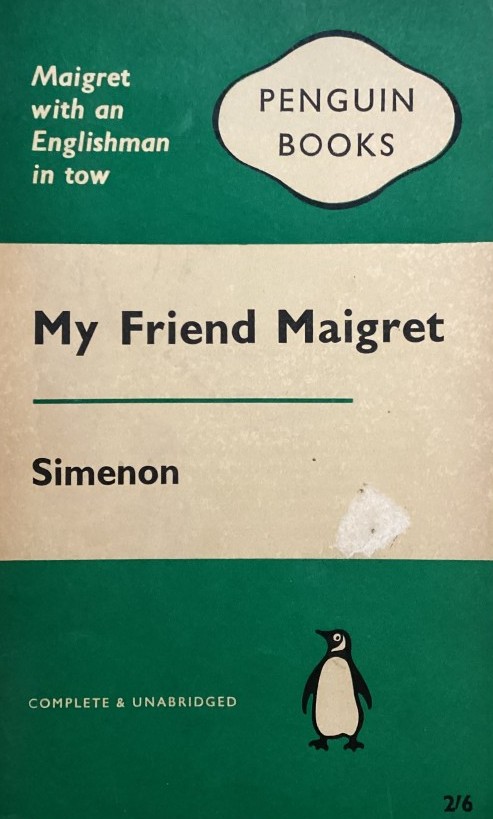Inspiring Older Readers
 posted on 26 Nov 2023
posted on 26 Nov 2023
My Friend Maigret by Georges Simenon
Chief Inspector Jules Maigret is, I think, my favourite fictional detective. I love the fact that he’s not, like so many of his modern peers, a tortured soul fighting his own flaming demons: but he is human and civilised. He has his doubts, he struggles with life in the same way as many of us do but when it comes to his job, he’s intuitive, smart and commands respect.
So, I picked up this 1949 offering, My Friend Maigret, with eager anticipation and settled down to read this slim volume in barely two gulps. And, given that I’ve had a few disappointments finding a book to engage with recently, I was delighted to find that Simenon was operating on all cylinders for this one.
On this occasion, Maigret has found himself saddled with a British ‘shadow’ – Inspector Pyke, who has come to observe how the great Maigret works and to see if there are lessons and methods he can take back to his own force. This, of course, is deeply unsettling for Maigret who finds himself constantly second-guessing himself and wondering, silently, whether he’s being judged. In short, he’s living with a giant dose of imposter syndrome.
When the news comes through that there has been a murder on Porquerolles, which is an island off France's Mediterranean coast inhabited mainly by a motley population of fishermen, transients, minor crooks and lost souls, Maigret decides he (and his shadow) should leave Paris and investigate on the island. Maigret’s interest has been piqued by the fact that the murdered man appears to have been shot for claiming that the Chief Inspector was a friend of his.
Simenon is such a skilled writer that from the moment Maigret and his companion arrive on the island a sort of humid, voluptuous, lethargic atmosphere descends on the book. This is Maigret in the land of the Lotus Eaters. The cast of characters are enveloped in a sort of haze of indolence that begins to seep into the behaviour of both Maigret and Pyke. Constantly fearful that he’s being watched and judged by his British visitor, Maigret finds himself questioning whether he really has any method of investigation at all, let alone one that offers any lessons to the British.
The island setting and the general sense of a population caught there as if they were on fly-paper, almost makes this detective puzzle similar to a closed room mystery and it may even tempt you to compare Simenon’s storytelling to that of someone like Agatha Christie – maybe something like Death on the Nile. But you will very quickly discover that Simenon’s book has a depth and texture that Christie doesn’t get near and probably didn’t aspire to.
Maigret edges towards a solution of the crime almost imperceptibly but when the game is finally on, he’s focussed and hardened. Does this, he wonders, really amount to a ‘method’? Is he really someone to learn from? Would he have handled this differently if he wasn’t constantly conscious of being watched?
You will have noticed that I haven’t actually told you anything much about the characters in the book or the actual circumstances of the murder – and I don’t plan to do so. As I suggested, this is a short novel and there’s very little to be said about these things that won’t end up being a spoiler – not just of the mystery but of the pleasure in encountering the cast of individuals that Simenon has conjured-up.
This book is not just an intellectual delight to read but the writing makes it a sensual pleasure too – one you can let yourself be wrapped in.
Paperback copies are easy enough to find – I picked up this vintage Penguin for a couple of pounds but more modern editions won’t cost you much more.
Terry Potter
November 2023